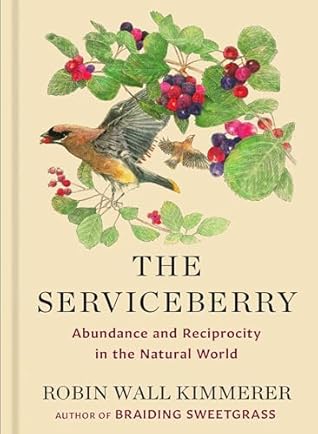More on this book
Community
Kindle Notes & Highlights
Read between
October 12 - October 19, 2025
Ethnobotanists know that the more names a plant has, the greater its cultural importance.
James Vukelich, an Anishinaabe linguist, teaches that these plant gifts are “a manifestation of unconditional love that plants have for people.” Plants offer whatever they have, to whoever needs it, “saint and sinner, alike,” he writes.
In a traditional Anishinaabe economy, the land is the source of all goods and services, which are distributed in a kind of gift exchange: one life is given in support of another. The focus is on supporting the good of the people, not only an individual. Receiving a gift from the land is coupled to attached responsibilities of sharing, respect, reciprocity, and gratitude—of which you will be reminded. This kind of gratitude is so much more than a polite “thank you.” Not an automatic ritual of “manners,” but a recognition of indebtedness that can stop you in your tracks—it brings you the
...more
Many Indigenous Peoples, including my Anishinaabe relatives and my Haudenosaunee neighbors, inherit what is known as “a culture of gratitude,” where lifeways are organized around recognition and responsibility for earthly gifts, both ceremonial and pragmatic. Our oldest teaching stories remind us that failure to show gratitude dishonors the gift and brings serious consequences. If you dishonor the Beavers by taking too many they will leave. If you waste the Corn, you’ll go hungry. Enumerating the gifts you’ve received creates a sense of abundance, the knowing that you already have what you
...more
Climate catastrophe and biodiversity loss are the consequences of unrestrained taking by humans. Might cultivation of gratitude be part of the solution?
This is the power of gift thinking. I imagine if we acknowledged that everything we consume is the gift of Mother Earth, we would take better care of what we are given.
In a gift economy, wealth is understood as having enough to share, and the practice for dealing with abundance is to give it away. In fact, status is determined not by how much one accumulates, but by how much one gives away.
The practice of observing the living world and taking inspiration for human ways of living from its model is an essential element of Indigenous science. It embraces the reality that there are intelligences other than our own, from whom we might learn.
We often lay the blame for the outcomes of cutthroat capitalism on the “System.” There’s merit in that, given the complex layered interactions, but no excuse. Let’s remember that the “System” is led by individuals, by a relatively small number of people,
What if scarcity is just a cultural construct, a fiction that fences us off from a better way of life?
I cherish the notion of the gift economy, that we might back away from the grinding system, which reduces everything to a commodity and leaves most of us bereft of what we really want: a sense of belonging and relationship and purpose and beauty, which can never be commoditized. I want to be part of a system in which wealth means having enough to share, and where the gratification of meeting your family needs is not poisoned by destroying that possibility for someone else. I want to live in a society where the currency of exchange is gratitude and the infinitely renewable resource of kindness,
...more


